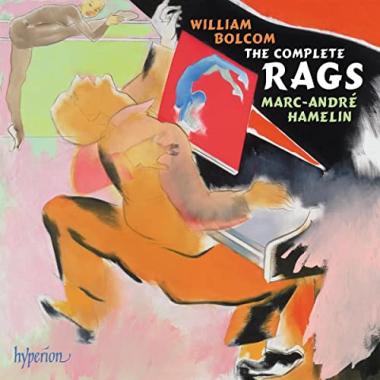
In the general scheme of William Bolcom’s prolific composing ways — nine symphonies, 12 string quartets, concertos, operas, theater pieces, song cycles, and so forth — his involvement with ragtime might seem like a footnote. Yet it turned out to be crucial in shaping his stance as an inspired American eclectic, open to all influences without giving extra weight to any.
Bolcom anticipated the revival of ragtime, and Scott Joplin in particular, by about three years. On a whim in 1967, he hunted down the score of Joplin’s then-obscure opera Treemonisha, which, in turn, inspired him to try his own hand at writing rags. They’re wonderful little pieces that remove the cobwebs of a half century of neglect of the idiom, breathe new life into the formal structures, and then develop or undermine them with injections of advanced harmonies, deeper emotional resonances, and, most delightfully, Bolcom’s own quirky sense of humor. Canadian pianist Marc-André Hamelin — who has become one of the greats of our era — has recorded all 27 rags on two discs (Hyperion), catching their reverence and irreverence with equal brilliance.

The majority of the 27 rags in the collection come from the years 1967–1972, when the revival was getting underway. Then, just as Joplin was becoming the rage thanks to Joshua Rifkin’s and Gunther Schuller’s recordings — and decisively, a film called The Sting that yielded a number-one hit album — Bolcom’s rags dribble down to a handful over the next four decades. He was trying to wean himself off his rag addiction as early as 1969 with “Last Rag,” which sounds like a fond, nostalgic farewell to the form. But it didn’t take. Yet.
The collection starts off on a breezy note with “Eubie’s Luckey Day” (honoring stride piano masters Eubie Blake and Luckey Roberts), which has some ever so slightly off-kilter syncopations Bolcom writes that his early “Incineratorag” is closest to the Joplin style, and indeed it is in structure. “Tabby Cat Walk” is a gentle, loping stroll that saunters like a cat walking in the silent way they do such things, stopping suddenly four times in mid-sentence or crawl. The witty “Knockout ‘A Rag’” (2008), one of just three from this century, uses the pianist’s knuckles against the fallboard (the lid the covers the keys on a piano) in strategic spots. Some echoes of Milhaud’s Saudades do Brasil come through in Bolcom’s “Rag-Tango” (1971), written a few years before he started recording Milhaud.
In the most obvious example of Bolcom expanding the form, The Garden of Eden is a full-blown rag “suite.” Following the short, jaunty “Old Adam,” “The Eternal Feminine” starts seductively and conventionally, but the third strain is unpredictable as it wanders harmonically. “The Serpent’s Kiss” is a combination of super-stride, rag, toccata, and the old soft shoe, with all kinds of strange changeups and sudden funny smashups — a microcosm of the way Bolcom’s mind works in some of his other pieces — while “Through Eden’s Gates” has Adam and Eve finding peace at last.

Leading off the cycle Three Ghost Rags, “Graceful Ghost Rag” may be the most famous contemporary rag by anyone, much in demand as an encore, given a lovely reading by Hamelin, who is aware of its genteel wit. “The Poltergeist” flits about, with some surprise pauses for humor. “Dream Shadows” is another gentle, friendly slow rag with some oddball key changes in the final strain.
“Brass Knuckles,” written jointly with William Albright, has some crunching clusters thrown in with humorous effect; those must be the brass knuckles. It’s a real trip, and Hamelin handles the crunches with gusto. I also like the happy-go-lucky lead tune and boogie-woogie final strain of “Knight Hubert” —whereas “Lost Lady Rag,” written after the breakup of Bolcom’s first marriage, is exactly the opposite, full of regret. Fortunately, all ends well in that department as “Contentment” (2015) — dedicated to Bolcom’s current wife of 47 years, singer Joan Morris — has a comfortable, settled feeling.
Bolcom believes that “Contentment” “really” is his last rag, but I wouldn’t bet a Steinway grand on it. He’s said that before.




